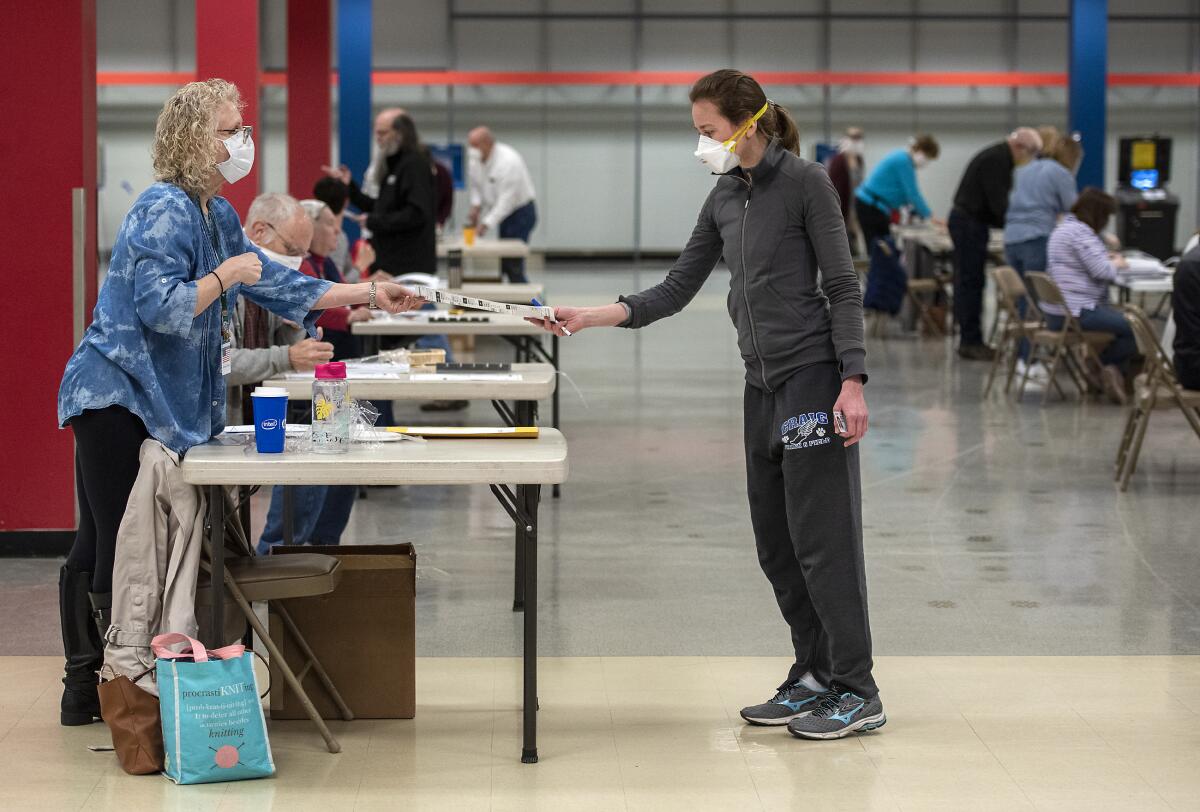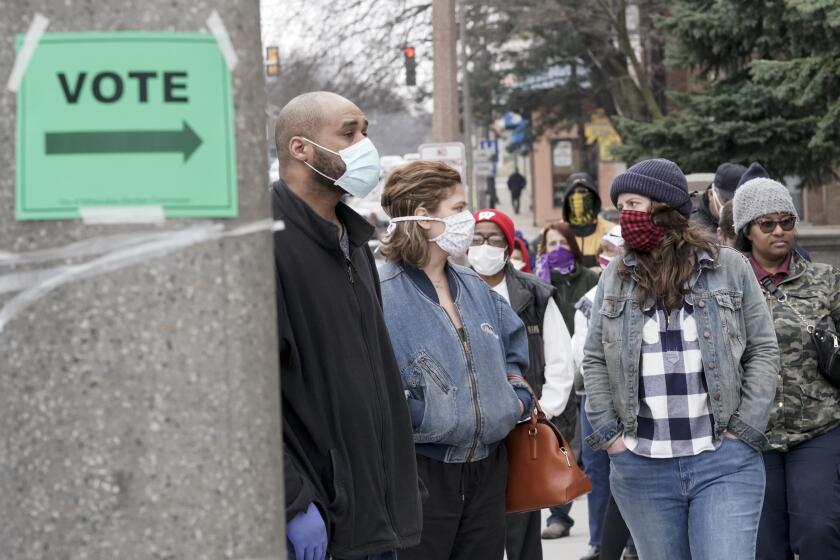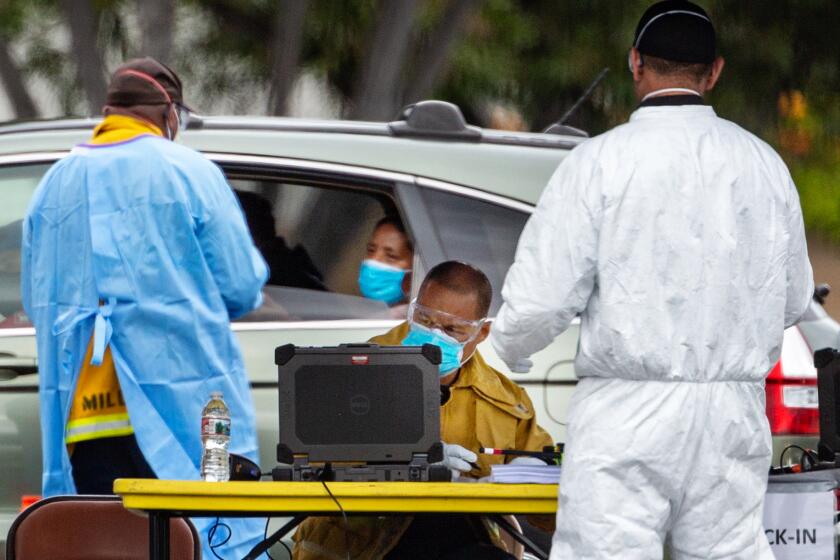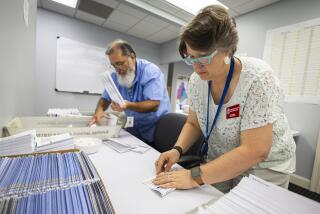After chaos in Wisconsin, fight intensifies over how to carry out presidential election amid pandemic

- Share via
WASHINGTON — The political and legal chaos that engulfed Wisconsin’s primary Tuesday marked the beginning of a national battle over how democracy will function in the middle of a pandemic — a months-long struggle that could tip the balance of power between the major political parties.
At stake is the most basic function of a democracy — the ability to hold elections that partisans on both sides regard as valid. That consensus, already eroded in the Trump era, is now being further undermined.
Prompted by Republicans’ refusal to postpone the state’s primary, the Wisconsin meltdown whipsawed voters with on-again, off-again election plans, polling locations drastically reduced, and makeshift protections against contagion. It provided the most public view so far of partisan tension over election rules and how they threaten to sow chaos in upcoming primaries and the general election.
Republicans for years have viewed measures to expand access to the ballot as attempts by Democrats to gain an advantage. In the current crisis, they have launched a coordinated national effort to limit the ramp-up of absentee and mail-in voting, which have been urged by independent election-integrity experts in the face of the coronavirus.
If the pandemic continues into the fall — or if the virus recedes during the summer and then returns, as many experts expect — that could force millions of voters to choose between casting their ballots and safeguarding their health.
The battle is playing out now because states that don’t currently allow widespread mail-in balloting would have to begin changing their systems soon to have any hope of pulling off a mail-in election in the fall.
The GOP once backed mail-in balloting when it was viewed primarily as a tool to expand voting options for seniors. Now, however, party leaders, from President Trump on down, are openly working to block proposals by election officials to mitigate disruption.
The Wisconsin primary election, held amid the coronavirus outbreak, followed legal battles between the Democratic governor and Republican lawmakers.
Democrats said the chaos in Wisconsin underscored the importance of planning for remote balloting in the general election.
“We should be thinking ahead now,” former Vice President Joe Biden, the Democrats’ likely presidential nominee, said Tuesday on NBC’s “Today” show. “Have all the experts, both political parties and academia laying out what it would take to have voting by mail.”
Trump and many of his Republican allies, however, portray moves to expand mail-in ballots not as neutral contingency plans to accommodate a public health threat, but as a partisan ploy to engineer a lasting expansion of the electorate in Democrats’ favor.
The president continues to make false claims about massive voter fraud. Although a White House task force he set up in 2017 to investigate that issue collapsed after less than a year without turning up any evidence of such widespread fraud, Trump remains undeterred.
“Mail ballots, they cheat. Mail ballots are a very dangerous thing for this country,” he said Tuesday.
“They talk about safety, safety,” he added. “The mail ballots are corrupt, in my opinion.”
More recently, he and other GOP leaders have been candid about another reason they are fighting mail ballots: They believe expanded voter participation could cost the GOP politically.
Criticizing Democratic vote-by-mail proposals in Congress, Trump said on “Fox and Friends,” “They had a level of voting that, if you ever agreed to it, you’d never have a Republican elected in this country again.”
Democrats see the Republican maneuvers as part of an effort by Trump to use illicit means to cling to power.
“This pandemic is fast becoming a three-pronged crisis,” said Ellen Kurz, president of IVote, a Democratic political action committee working to expand voting rights. “There is the health crisis, the financial crisis, and now we have a potentially just as big a democracy crisis.... The president is using his authority overseeing the pandemic to try to prevent people who want him out of office from voting.”
The Republican efforts to block expanded mail-in balloting cover a host of battleground states.
In North Carolina, Republicans are resisting proposals to ease requirements for witnessing absentee ballots during the pandemic. In Georgia, GOP officials have set up a new task force to scrutinize absentee ballots, a move that critics say amounts to voter intimidation.
In Michigan, Republicans are defending the constitutionality of laws that sharply restrict the collection of absentee ballots by third parties — a practice critics call “ballot harvesting,” which Republicans have blamed for their widespread losses in California in the 2018 midterm election.
There is a risk to expanding mail voting, according to election experts, but it is not fraud. The tracking safeguards that are layered over mail-voting systems already offered to many millions of Americans — particularly the requirement for matching the signature on the ballot envelope to a signature on file — make misuse of ballots easy to detect.
The bigger challenge, experts say, is that those safeguards can mistakenly block valid voters because, for example, a signature varies slightly from the one on file or their mailing address in government records is out of date.
The risks would be overshadowed by the threat of disenfranchisement at a much larger scale if multiple states proceed in November as Wisconsin did Tuesday.
“What is particularly concerning are these signs in Wisconsin that the failure to protect the vote was on purpose,” said Wendy Weiser, director of the Democracy Program at the Brennan Center for Justice at NYU School of Law.
“The president and some of the other national Republican leaders have been making broad public statements that everybody voting would be a problem. And then they are trying to foment fears of mail balloting, despite the fact that for much of the country, that could be the only way people could participate in November.”
Los Angeles County is expanding coronavirus testing to more people. Here’s how to get in line.
In the midst of the Wisconsin imbroglio, congressional Democrats are intensifying their push to expand mail voting for November. Senate Minority Leader Charles E. Schumer of New York told reporters Tuesday that the issue has become a key negotiating point in the next stimulus package.
“The moment we are in will create a precedent for how democracy is managed in crisis for decades to come,” said Michigan Secretary of State Jocelyn Benson, a Democrat.
Her state is on the front lines of the battle. A popular 2018 ballot measure changed the state constitution to allow everyone to vote by mail. The state rapidly made the transition. Participation in elections has soared, including among GOP voters.
Many of the Republican worries about mail voting are rooted in the belief that it would boost turnout among lower-income and marginalized voters who have a harder time getting to the polls, and vote Democratic when they do.
That’s not necessarily true, and some experts believe that the GOP is mistakenly hurting its own prospects. In Wisconsin, for example, recent elections for state Supreme Court seats suggested that conservative candidates did better with higher turnouts, said Rick Esenberg, founder of the conservative Wisconsin Institute for Law and Liberty.
Expanded mail voting in November could drive turnout among older voters, who trend Republican and are among the most likely to sit the election out if voting poses a health hazard.
Yet while they may be wrong to see a threat, Republican officials are persistent in fighting it.
In Georgia, where the primary has been postponed until May 19, all voters have been mailed applications for absentee ballots to encourage more mail-in voting. GOP House Speaker David Ralston objected, telling a local media outlet that expanded voting by mail “will be extremely devastating to Republicans and conservatives.”
Ralston later backtracked and said his concerns were driven not by politics but fraud potential.
In the many states where voting by mail has been the norm for years, there has been scant evidence of fraud. The rare exception is a case in North Carolina that involved a GOP operative who was caught illegally collecting and forging signatures on ballots during a 2018 congressional race. After he was charged, the election was nullified.
Election law experts say the case illustrated that the existing anti-fraud safeguards work. Yet the GOP-controlled Legislature restricted absentee voting in the aftermath, imposing a rule that such ballots be witnessed by two people or one notary — a requirement that will be harder to meet if the virus is raging in November and social distancing is in force.
The Democratic-controlled state Board of Elections has proposed easing the restrictions in the face of the virus. Republicans are suspicious.
“I’m concerned that this is an effort by partisan Democrats to try to tilt the landscape in their favor,” said Republican state Senate leader Phil Berger.
The charges and counter-charges are paralyzing efforts by state and county officials to adjust their systems. They are fast running out of time.
“Election officials don’t want to preside over an election that is under a cloud of illegitimacy or unfairness,” said Weiser. “We don’t have a lot of time to build the infrastructure.”
More to Read
Get the L.A. Times Politics newsletter
Deeply reported insights into legislation, politics and policy from Sacramento, Washington and beyond. In your inbox three times per week.
You may occasionally receive promotional content from the Los Angeles Times.















